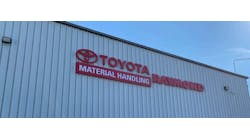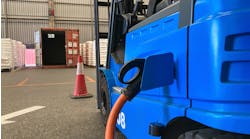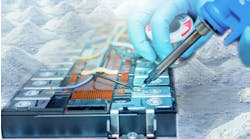Remember Geoffrey Ballard, a.k.a., the "Father of the Fuel Cell?" Anyone designated the "father" of anything technological leaves himself open to being called either a "visionary" or a " crackpot." If you read Ballard's vision of a hydrogen economy several years ago in this magazine, you may have thought he was both.
"Take a Wal-Mart, for example. They have DCs and 4,500 retail outlets and they're putting up new ones every day," said Ballard. "The DCs would have hydrogen on site to fuel the lift trucks that operate in those centers. They also have corresponding lift trucks in each of the stores, so the DC, through existing trucking arrangements, would deliver hydrogen to the retail outlets to run the three or four lift trucks in each of those locations. The hydrogen could also run the uninterruptible power system that's in each retail outlet. Now you have, very quickly, at an industrial level, a pathway for hydrogen to go right to the consumer shopping mall."
Well it's mid-2006 and Wal-Mart is beta testing fuel-cell-powered pallet trucks. Its short-term intent is to test the viability of replacing lead acid batteries with fuel cells. In the longer term, Wal-Mart's Vice President of Logistics Administration, Joel Marpe, acknowledges his company may someday play a role in the hydrogen power infrastructure.
"We've been approached about taking solar energy to create hydrogen fuel, and at some point that may be a consideration," says Marpe. First, however, he's interested in seeing how fuel cells will affect Wal-Mart's own infrastructure.
To test the productivity of fuel cells and to measure their benefits inside Wal-Mart facilities It's using pallet jacks from Crown Equipment Corp. (New Bremen, Ohio) and Barrett Industrial Trucks (Marengo, Ill.) and fuel cell power units from Cellex Power Products (Richmond, B.C.). It will test their feasibility for uninterrupted power, for eliminating the battery change process and for changing the way it design its logistics operations.
"We also have capital considerations for new buildings, and if I don't have to build a battery room and buy two batteries for every vehicle, and invest in the necessary chargers and changers, then from a sustainability perspective, not having a lead acid battery could be a benefit," he adds.
All Marpe has to do in the next series of tests is prove the return on investment. He's investing in 12 fuel cells and splitting them up between two different DCs, each with six fuel-cell-powered pallet trucks. Beyond these tests Marpe is leaving the door open to testing other types of lift trucks. "At some point fuel cells will be an alternative," he says. "Today the infrastructure still doesn't exist and the costs are still fairly high. But if there could be a breakthrough both from the user cost perspective and the infrastructure as it relates to distribution of hydrogen, and we think there is, this will be a good solid alternative."
Marpe is studying the city of Chicago's experience running several buses on hydrogen fuel cells. He says those lessons will be reviewed when Wal-Mart considers fuel cells for its own over-the-road truck fleets.
Is Wal-Mart on the right track? Will Wal-Mart's pioneering trials with fuel cells make a difference? Tell me what you think.
Tom Andel has written about and been deeply involved in the material handling industry for more than 26 years.


